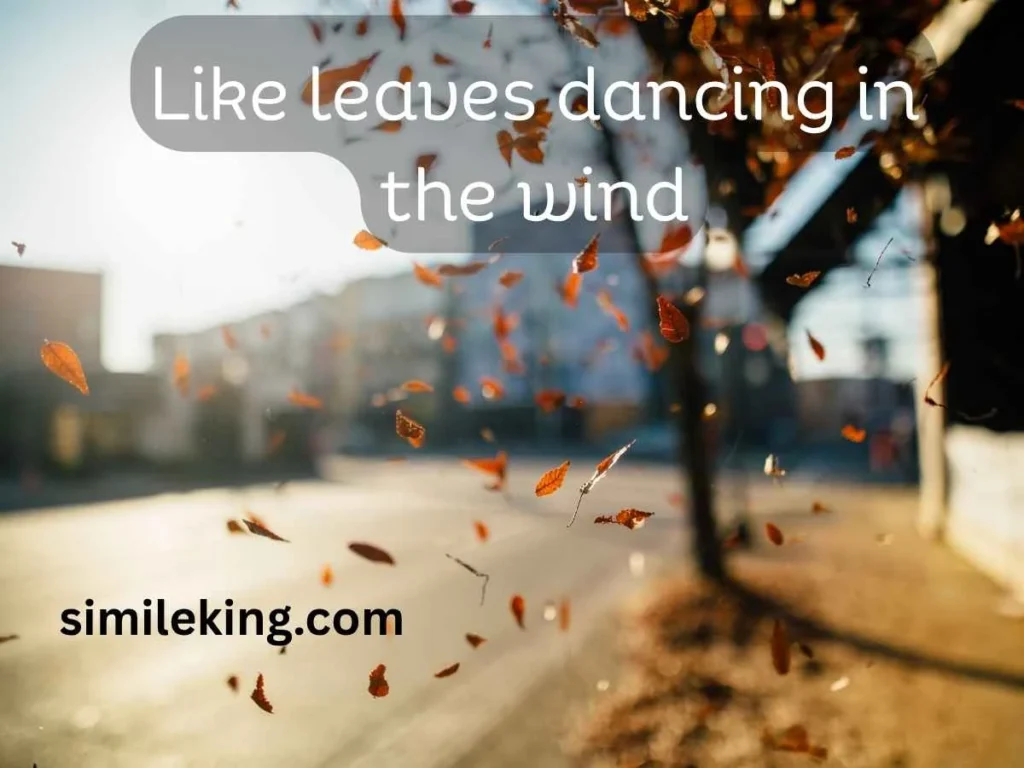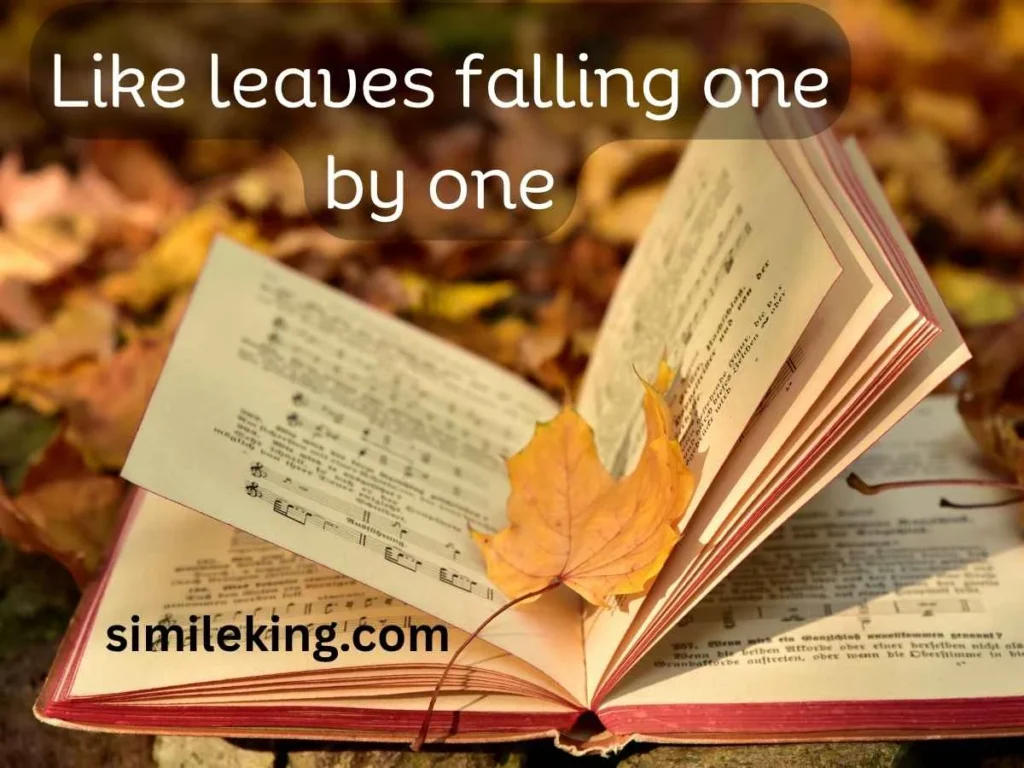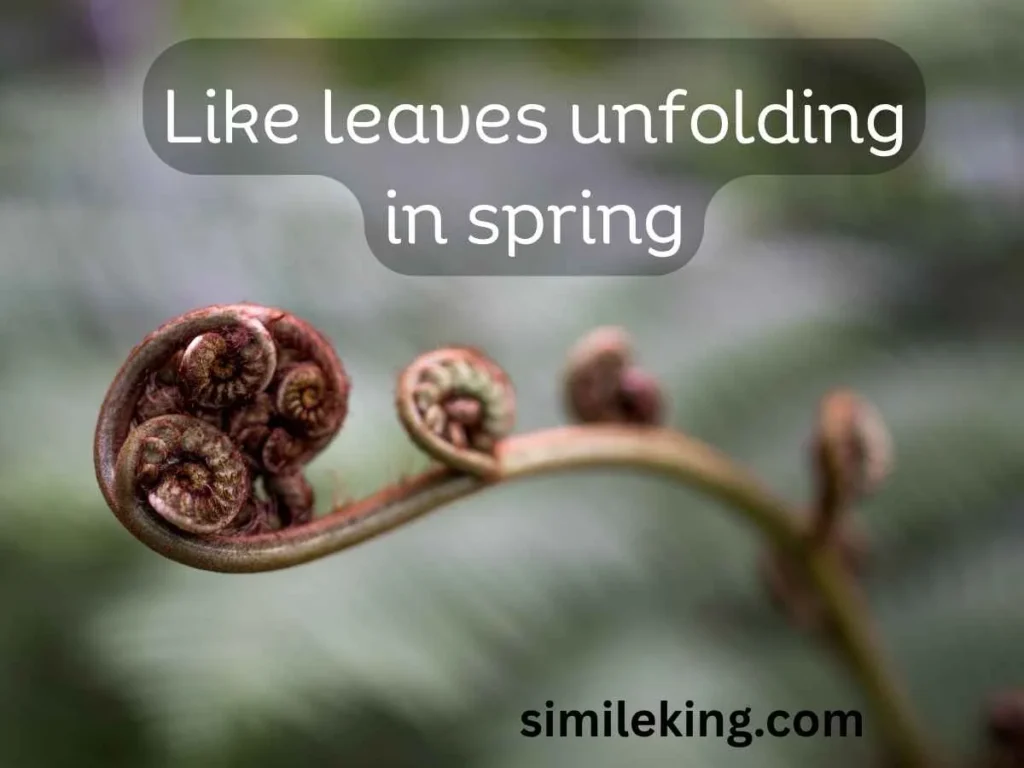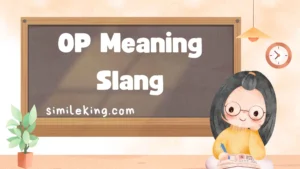Leaves have captivated writers, poets, and artists for centuries. Their colors, textures, movement, and transformations mirror human emotions, seasons of life, and the ever-changing flow of nature. Whether fluttering in the breeze or crunching underfoot in autumn, leaves offer rich inspiration for figurative language—especially similes.
This article explores 15+ vivid similes for “leaves”, examining different expressions suitable for poetic, formal, or casual use. You’ll also find insights into how to choose the right simile depending on your message’s tone, mood, and medium—from essays to text messages. Five examples at the end are specially tailored for texting and optimized for Google-friendly usage.
What Is a Simile?
A simile is a figure of speech that compares two unlike things using the words like or as. For example:
- Her laughter was like leaves rustling in the wind.
Similes help readers or listeners visualize, feel, or connect more deeply with a thought by drawing imaginative comparisons.
Why Use Similes for Leaves?
Leaves are powerful metaphors for:
- Life stages (budding, maturing, falling)
- Emotions (restlessness, peace, melancholy)
- Nature’s rhythm (change, cycles, renewal)
When you compare something to a leaf, you instantly conjure imagery that feels organic, seasonal, and emotional—perfect for storytelling, poetry, and heartfelt messages.
15+ Similes for Leaves (with Tone and Examples)
Below are 15+ similes categorized by tone: poetic, professional, casual, and emotional.
🌿 1. Like leaves dancing in the wind

Tone: Poetic
Use: To describe someone who moves lightly or lives freely.
Example:
She moved across the stage like leaves dancing in the wind—graceful and unchained.
🍁 2. As dry as autumn leaves
Tone: Neutral / Descriptive
Use: To describe texture, age, or withered beauty.
Example:
His voice was as dry as autumn leaves, brittle with time.
🍃 3. Like a leaf trembling on its stem
Tone: Emotional
Use: To convey nervousness or vulnerability.
Example:
He stood at the door like a leaf trembling on its stem.
🍂 4. As restless as leaves before a storm
Tone: Poetic / Emotional
Use: To describe inner turmoil or anticipation.
Example:
She felt as restless as leaves before a storm, uncertain but ready.
🌳 5. Like leaves falling one by one

Tone: Melancholic / Reflective
Use: To depict loss or the slow passage of time.
Example:
The memories left her, like leaves falling one by one.
🍂 6. As scattered as fallen leaves on a path
Tone: Reflective / Thoughtful
Use: For disorganization or emotional scattering.
Example:
His thoughts were as scattered as fallen leaves on a path.
🌬️ 7. Like leaves swept away by the wind
Tone: Dramatic / Emotional
Use: For sudden change, loss, or surrender.
Example:
They vanished from her life like leaves swept away by the wind.
☀️ 8. As golden as autumn leaves in sunlight
Tone: Romantic / Aesthetic
Use: To describe warmth, beauty, or nostalgia.
Example:
Her smile was as golden as autumn leaves in sunlight.
💨 9. Like a leaf caught in a whirlwind
Tone: Chaotic / Dramatic
Use: For a character or moment filled with confusion or panic.
Example:
He ran like a leaf caught in a whirlwind, unsure and afraid.
🌲 10. As quiet as leaves falling in winter
Tone: Calm / Melancholic
Use: To describe stillness or subtlety.
Example:
Her words were as quiet as leaves falling in winter.
🍀 11. Like leaves unfolding in spring

Tone: Hopeful / Inspirational
Use: For growth, renewal, or new beginnings.
Example:
He opened up like leaves unfolding in spring.
🌼 12. As fragile as a newly budded leaf
Tone: Emotional / Romantic
Use: For tenderness or vulnerability.
Example:
Her heart was as fragile as a newly budded leaf.
🌀 13. Like leaves blown in every direction
Tone: Critical / Observational
Use: To describe indecision or a lack of direction.
Example:
He goes wherever life takes him—like leaves blown in every direction.
🌾 14. As natural as leaves in the breeze
Tone: Compliment / Positive
Use: To describe grace, ease, or authenticity.
Example:
Her dance felt as natural as leaves in the breeze.
🌧️ 15. Like leaves drenched in rain
Tone: Emotional / Poetic
Use: For sorrow, beauty in sadness, or cleansing.
Example:
He stood quietly, like leaves drenched in rain—soaked but strong.
🪶 16. As light as a falling leaf
Tone: Light / Playful
Use: To describe weightlessness or gentleness.
Example:
She floated into the room as light as a falling leaf.
How to Choose the Best Simile for Leaves
Selecting the right simile depends on:
| Factor | Guidance |
|---|---|
| Tone | Choose poetic similes for creative writing; simple ones for casual use. |
| Emotion | Want sadness? Use falling/dry leaves. Joy? Use spring/golden leaves. |
| Audience | Use abstract comparisons for literature; familiar ones for texting/social. |
| Medium | Formal writing may benefit from deeper metaphors, while texts should stay simple. |
5 Google-Optimized Texting Examples Using Leaf Similes
Here are short, natural-sounding texting examples perfect for messaging or posting online:
- “Feeling a little off today… like a leaf blowing wherever the wind takes it 🍃.”
- “Your words were as quiet as leaves falling—soft, but they stayed with me.”
- “She walked in like leaves dancing in the wind—so free, so full of life.”
- “I’m tired but hopeful… like leaves unfolding after winter.”
- “Our plans scattered like dry leaves. Oh well, next time! 🍁”
These are optimized with emojis, everyday language, and relatable metaphors to appeal to Google’s featured snippets and real-life search behavior.
Conclusion
Leaves offer endless poetic inspiration. Whether you’re writing poetry, sending a text, or describing emotion, similes for leaves add color, depth, and relatability to your words. Use this guide as a reference whenever you need to enrich your language, match a mood, or engage your reader with nature-based metaphors.
Remember: great similes don’t just compare—they connect.





